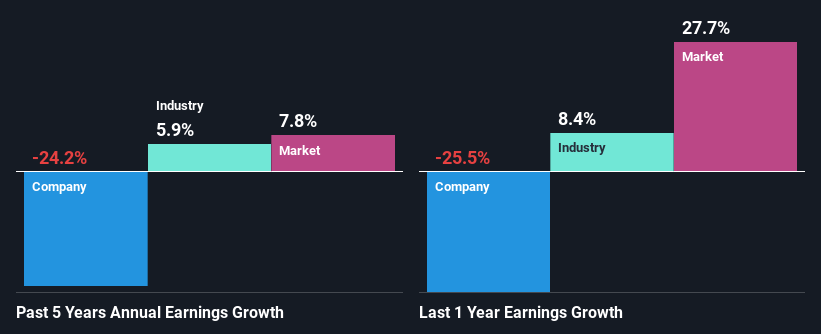Genesis Energy Limited (NZSE:GNE) Stock's On A Decline: Are Poor Fundamentals The Cause?
It is hard to get excited after looking at Genesis Energy's (NZSE:GNE) recent performance, when its stock has declined 4.9% over the past month. Given that stock prices are usually driven by a company’s fundamentals over the long term, which in this case look pretty weak, we decided to study the company's key financial indicators. Particularly, we will be paying attention to Genesis Energy's ROE today.
Return on equity or ROE is a key measure used to assess how efficiently a company's management is utilizing the company's capital. In simpler terms, it measures the profitability of a company in relation to shareholder's equity.
See our latest analysis for Genesis Energy
How To Calculate Return On Equity?
The formula for return on equity is:
Return on Equity = Net Profit (from continuing operations) ÷ Shareholders' Equity
So, based on the above formula, the ROE for Genesis Energy is:
3.2% = NZ$66m ÷ NZ$2.1b (Based on the trailing twelve months to December 2021).
The 'return' is the income the business earned over the last year. One way to conceptualize this is that for each NZ$1 of shareholders' capital it has, the company made NZ$0.03 in profit.
Why Is ROE Important For Earnings Growth?
We have already established that ROE serves as an efficient profit-generating gauge for a company's future earnings. We now need to evaluate how much profit the company reinvests or "retains" for future growth which then gives us an idea about the growth potential of the company. Assuming all else is equal, companies that have both a higher return on equity and higher profit retention are usually the ones that have a higher growth rate when compared to companies that don't have the same features.
A Side By Side comparison of Genesis Energy's Earnings Growth And 3.2% ROE
As you can see, Genesis Energy's ROE looks pretty weak. Not just that, even compared to the industry average of 9.9%, the company's ROE is entirely unremarkable. For this reason, Genesis Energy's five year net income decline of 24% is not surprising given its lower ROE. However, there could also be other factors causing the earnings to decline. For example, the business has allocated capital poorly, or that the company has a very high payout ratio.
However, when we compared Genesis Energy's growth with the industry we found that while the company's earnings have been shrinking, the industry has seen an earnings growth of 1.7% in the same period. This is quite worrisome.
Earnings growth is a huge factor in stock valuation. What investors need to determine next is if the expected earnings growth, or the lack of it, is already built into the share price. By doing so, they will have an idea if the stock is headed into clear blue waters or if swampy waters await. Is Genesis Energy fairly valued compared to other companies? These 3 valuation measures might help you decide.
Is Genesis Energy Efficiently Re-investing Its Profits?
With a three-year median payout ratio as high as 365%,Genesis Energy's shrinking earnings don't come as a surprise as the company is paying a dividend which is beyond its means. Paying a dividend higher than reported profits is not a sustainable move. Our risks dashboard should have the 3 risks we have identified for Genesis Energy.
Moreover, Genesis Energy has been paying dividends for eight years, which is a considerable amount of time, suggesting that management must have perceived that the shareholders prefer consistent dividends even though earnings have been shrinking. Upon studying the latest analysts' consensus data, we found that the company's future payout ratio is expected to drop to 150% over the next three years. As a result, the expected drop in Genesis Energy's payout ratio explains the anticipated rise in the company's future ROE to 6.7%, over the same period.
Summary
On the whole, Genesis Energy's performance is quite a big let-down. The low ROE, combined with the fact that the company is paying out almost if not all, of its profits as dividends, has resulted in the lack or absence of growth in its earnings. Having said that, looking at current analyst estimates, we found that the company's earnings growth rate is expected to see a huge improvement. To know more about the company's future earnings growth forecasts take a look at this free report on analyst forecasts for the company to find out more.
Have feedback on this article? Concerned about the content? Get in touch with us directly. Alternatively, email editorial-team (at) simplywallst.com.
This article by Simply Wall St is general in nature. We provide commentary based on historical data and analyst forecasts only using an unbiased methodology and our articles are not intended to be financial advice. It does not constitute a recommendation to buy or sell any stock, and does not take account of your objectives, or your financial situation. We aim to bring you long-term focused analysis driven by fundamental data. Note that our analysis may not factor in the latest price-sensitive company announcements or qualitative material. Simply Wall St has no position in any stocks mentioned.

 Yahoo Finance
Yahoo Finance 
